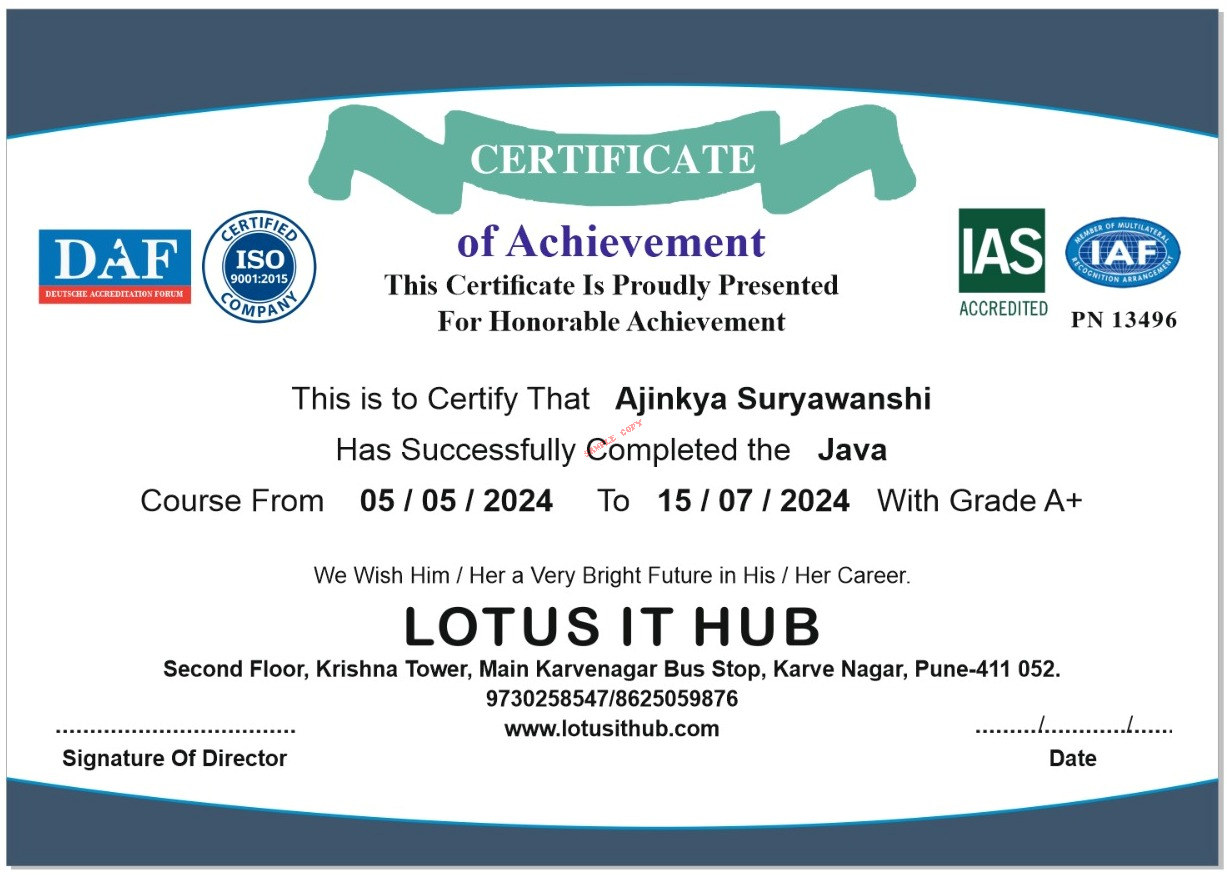Master MVC: Join Top-rated MVC Classes in Pune!
Introduction to MVC
What is MVC?
Model-View-Controller, or MVC for short, is an architectural design used in software development to divide up problems and arrange code logically.
Parts of MVC:
- Model: Application data and business logic are represented by the model. It oversees the data, answers queries on its condition, and does operations on it as directed by the Controller.
- View: The user's data presentation in a particular format is the responsibility of the View. Following user input, it sends it on to the Controller.
- Controller: The Controller stands in for the Model and the View in between. Processing user input from the View, it modifies the Model appropriately.
Benefits of MVC:
- Separation of Concerns: MVC facilitates easier codebase management and maintenance by dividing the programme into three independent, independently operating components.
- Code Reusability: Because components of an MVC application may be readily modified and used in other areas of the programme, the framework encourages code reuse.
- Testability: Better overall test coverage and simpler unit testing are made possible by the ability of each MVC component to be tested separately.
MVC’s Disadvantages:
- Added Complexity: Especially for smaller projects when the expense of maintaining different components may exceed the advantages, using MVC might add more complexity to the application.
- Overhead in Small Projects: The overhead of putting MVC into place could not be justified for straightforward applications, which would result in needless complication and verbosity of the code.
Understanding the Model in Online MVC Training Institute in Pune
>Definition of Model: The business logic and data of the application are represented by the model. It offers ways to get at and change the state of the application and wraps it.
Accountabilities of the Model:
- Data Management: The Model oversees the data of the application, including its storage, retrieval, and updating.
- Business logic processing: It is the process of determining how data is handled and modified in an application and is included in the Model.
Model Implementation:
- Example Models: Depending on the programming language and framework being employed, models can be implemented using classes, structs, or data structures.
- Data Access Layers: A data access layer is a common component of database-driven applications that communicates with the database to carry out CRUD activities on the data.
Understanding the View in MVC Courses in Pune
Definition of the view: The user interface of the programme is represented by the View. Presenting the information to the user and getting their opinion are its responsibilities.
Accountabilities of the View:
- Displaying Data: The View gives the viewer an aesthetically pleasing presentation of the data that the Model has supplied.
- Managing User Input: The View records events involving user input and sends them on to the Controller for handling.
View Implementation:
- Templates and Layouts: Templates and Layouts specify the organisation and look of the user interface and are commonly used to construct views.
- Frontend Frameworks: HTML provides structure, CSS styles, and JavaScript provides dynamic behaviour for web-based views.
Understanding the Controller in MVC Training Institute in Pune
Definition of Controller: The Controller chooses the right View to show to the user and manages user input, updating the Model accordingly.
Accountabilities of the Controller:
- Routing Requests: The Controller directs user input from the View to the proper action or method for processing.
- Updating the Model: Modifying the state of the data or calling methods, the Controller modifies the Model in response to user input.
- Choosing the View: The Controller chooses, sending along any required data, the suitable View to display to the user when the Model has been changed.
Controller Implementation:
- Actions and Methods: Usually, controllers are built as classes or functions that include methods or actions that are corresponding to user actions.
- Complex business logic may be delegated by Controllers to the Model, which keeps the Controller lean and concentrated on processing requests.
Implementing MVC in Programming Language/Framework
Setting up the Project: Installing any required dependencies and configuring the development environment for the selected programming language or framework are part of setting up a project.
Developing Models: Data structures and business logic are defined as necessary in models, which are implemented according to the needs of the application.
Developing Views: Using suitable frontend technologies, views are planned and executed to graphically convey the data to the user.
Developing Controllers: User input is handled, the Model is updated, and the suitable View is chosen to render via controllers.
Integrating Components: Putting the MVC components together guarantees that the Model, View, and Controller operate in unison.
Testing and Debugging: Unit tests are built to evaluate the Model and Controller's functioning, and debugging methods are applied to solve any problems with the Views.
Advance Topics and Best Practices in MVC Classes in Pune
MVC Best Practices:
- Code Organisation: Keep the Models, Views, and Controllers' directories logical and unambiguous.
- Naming conventions: Class, method, and variable names should be consistent and evocative.
Authentication and Authorization: To manage access to certain application areas, put user authentication and authorization into place.
Data Validation and Sanitization: Sanitise and validate user input to protect data integrity and stop security flaws.
Performance Optimization: Application speed may be increased by using lazy loading methods and caching systems.
RESTful API Development: Build RESTful APIs for client- and server-side component interactions by utilising MVC concepts.
Real-world Examples and Case Studies: Explore examples and case studies of MVC architecture in web development and desktop apps.
Conclusion:
Lotus IT Hub is one of the best MVC Training Institutes in Pune. We offer MVC classes in Pune at affordable fees which can be accessed by anyone desiring to learn MVC. We have designed courses in such a way that it suits not only novices but also experts. We provide MVC training in Pune with 100% placement.
FAQ - Frequently Asked Questions
💬 Talk to Adviser
Get expert guidance from our experienced professionals in every field.
Skills & Tools You'll Learn
Programming Fundamentals
- Algorithms & Data Structures
- Problem Solving
- OOP Concepts
- Version Control (Git)
Development Tools
- IDEs & Text Editors
- CLI & Terminal
- Package Managers
- Build Tools
Software Practices
- Agile & Scrum
- Testing (Unit & Integration)
- Code Reviews
- CI/CD Workflows
Platforms & Technologies
- Databases (SQL/NoSQL)
- Cloud (AWS, GCP)
- APIs (REST & GraphQL)
- Docker & Kubernetes
Our Certifications
Gain globally recognized certifications that validate your skills and boost your career.
Earn Your Achievement Certificate

After completing your course, you’ll receive a verified certificate from Lotus IT Hub, showcasing your mastery of industry-relevant skills. This certificate can be shared on LinkedIn, added to your resume, and helps you stand out in the job market.
- Globally recognized certificate
- Verification ID for authenticity
- Downloadable digital format
- Shareable on LinkedIn & portfolios
Why Choose Lotus IT Hub
Empowering your career through expert training
Affordable & Customized Programs
Flexible pricing and learning plans
Hands-On Project Learning
Real-world practice to boost your skills
One-on-One Mentorship
Personalized guidance from industry experts



